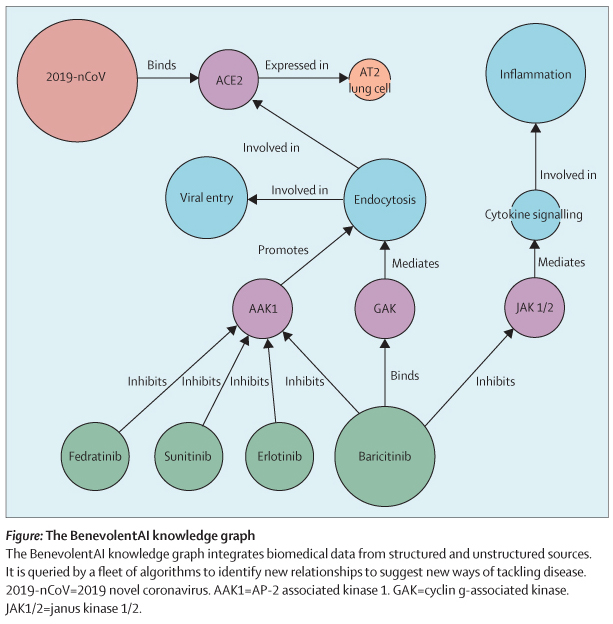Benevolent AI, a U.K.-based artificial intelligence (AI) healthcare firm, has claimed that Eli Lilly’s Olumiant (Ingredient: Baricitinib), a rheumatoid arthritis treatment, has the potential to be effective on the new coronavirus.
“Given the scale and speed of the spread of the new coronavirus, there is an immediate need for medicines that can help before a vaccine can be produced,” the company said. “Results of rapid sequencing of the new coronavirus, coupled with molecular modeling based on the genomes of related virus proteins, have suggested a few compounds seen to be effective, including the anti-HIV lopinavir plus ritonavir combination.”
To find other effective treatments, the company used its knowledge graph, which is a vast repository of structured medical information, including numerous connections extracted from the scientific literature by machine learning, it added.

“Together with customizations bespoke to the new coronavirus, we used BenevolentAI to search for approved drugs that could help, focusing on those that might block the viral infection process,” the company said. “We identified Baricitinib, which is predicted to reduce the ability of the virus to infect lung cells.”
According to the company, most viruses enter cells through receptor-mediated endocytosis.
“The receptor that new coronavirus uses to infect lung cells might be angiotensin-converting enzyme 2 (ACE2), a cell-surface protein on cells in the kidney, blood vessels, heart, and, importantly, lung AT2 alveolar epithelial cells,” the company said. “These AT2 cells are particularly prone to viral infection.” One of the known regulators of endocytosis is the AP2-associated protein kinase 1 (AAK1), it noted.
The firm stressed that the disruption of AAK1 might interrupt the passage of the virus into cells and also the intracellular assembly of virus particles.
By comparing it with the 378 AAK1 inhibitors in the company’s knowledge graph, the company confirmed that 47 had been approved for medical use and six inhibited AAK1 with high affinity.
“These included many oncology drugs such as sunitinib and erlotinib, both of which have been shown to inhibit viral infection of cells through the inhibition of AAK1,” the company said. “However, these compounds bring serious side-effects, and our data infer high doses to inhibit AAK1 effectively.” Therefore, the company does not consider these drugs would be a safe therapy for a population of sick and infected people, the company added.
Benevolent AI, however, added that one of the six high-affinity AAK1-binding drugs was the Janus kinase inhibitor Baricitinib, which also binds the cyclin G-associated kinase, another regulator of endocytosis.
“Because the plasma concentration of baricitinib on therapeutic dosing is sufficient to inhibit AAK1, we suggest it could be trialed, using an appropriate patient population with the new coronavirus to reduce both the viral entry and the inflammation in patients,” the company said. “We can use endpoints such as the MuLBSTA score, an early warning model for predicting mortality in viral pneumonia.”
Lancet published the results of the study.

